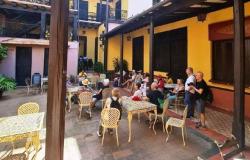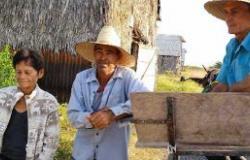
The director of the Valparaíso-San Antonio Health Service Cristian Gálvez together with his Social Participation team; Head of Public Health Carlos Zamora, representatives of Social Participation of the Viña-Quillota Health Services, Aconcagua Health Service and associations of indigenous peoples participated in the milestone of socialization and implementation of decree 21 in the Ruka Lawen of Peñablanca in Villa Alemana belonging to the SSVQ.
On December 29, Decree No. 21 was published, which approves regulations on the right of people belonging to indigenous peoples to receive health care with cultural relevance. Which means that the healing systems of indigenous peoples are recognized, protected and respected along with the religious, cultural and spiritual practices of said peoples.
The decree establishes general procedures and guidelines that public institutions must carry out, in the application of an intercultural health model validated before indigenous communities, safeguarding the full and effective rights of indigenous peoples through their own representative institutions.
It states that the decree recognizes, protects and respects the healing systems of indigenous peoples along with the religious, cultural and spiritual practices of said peoples.
The director of the Valparaíso-San Antonio Health Service, Cristian Gálvez valued the socialization instance of Decree 21 and the high significance of this milestone: “The promulgation of this regulation is a significant event for the communities and for the development and empowerment of the health program of indigenous peoples. It reflects years of work and various discussions that have taken place in different spaces. This particular instance challenges us as a health service and also the establishments in order to enhance the participation of the communities and the decision they have and They want their health. There is a particular conception of the different indigenous peoples, in the way they conceive health and illness and the way they want to be treated, and there is a special and particular attention to spiritual assistance that we must provide at all levels of care. primary care in clinics, Cesfam and in hospitals. The challenge for us is to implement as soon as possible and within the times established by the regulations the mechanisms that allow guaranteeing this right for indigenous peoples.”
María Soledad Alarcón Huenchupán, from the Domo-Taihuel indigenous women’s association mentioned that: “This milestone is based on international and national laws, this marks the need for us to be able to serve ourselves with cultural relevance in establishments. It has been a long fight for us to have culturally relevant health. It was necessary to be able to bring our medicine because we get sick here, therefore, what is going to be applied now, it took us a lot of work to have the empathy of the institutions and today it is something that is going to begin to be implemented.”
For its part, Camila Milchío Flores, sociologist, representative of Indigenous Peoples of the Valparaíso-San Antonio Health Service, pointed out: “As SSVSA we are going to implement a participatory model in which the communities of indigenous peoples who are in the region and Primary Health Care and hospital managers will participate and jointly build the protocols and policies to be implemented in all the health facilities of our grid”.





